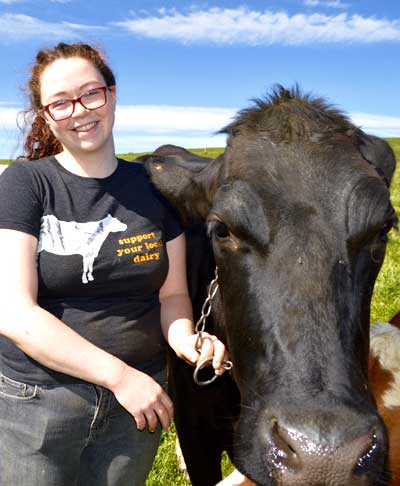 |
| Brooke Chase of Chase’s Organic Dairy Farm in Mapleton, Maine – one of dozens of MOFGA-certified organic dairy farms. English photo |
By Jacki Martinez Perkins
Some would say that owning a commercial organic dairy today is a losing proposition. For others it’s the only life they’ve known, and they would never think of changing. Dairy farming has never been an easy lifestyle. Few consumers realize the intelligence, ingenuity, skill and perseverance required to get a glass of milk or block of cheese to their refrigerator. Dairy is seen as a staple as essential as bread or eggs, and consumers often complain about the retail price with a sense of entitlement that shows our society’s disconnect from its food systems. Many people ask me, “Why should I buy organic, especially when there’s no antibiotics in milk?” I smile and ask if they want the short or long answer.
Until recently, the easy answer has been that by buying organic, they support small family farms by paying the farmer a living wage, and they encourage the continuation of smaller herds due to the limiting factors of land base for pasture management. In the past year, all that has changed. Organic dairy standards are not being interpreted equally across the United States, with some Western U.S. certifiers approving CAFO herds – concentrated animal feeding operations – where cows appear to have little access to pasture. Valuable rule changes, long fought for, have been discarded in favor of policies benefiting Big Ag. Counterfeit organic products have been shipped into the country from abroad. Most telling and disturbing are internal changes made by nationally recognized organic dairy labels. All have chosen to partner with global companies and have been making large regional cuts to the same small, family-owned dairies that championed the cause of organic not so long ago. These changes along with production quotas and price cuts have many farmers looking for alternative ways to stay in business.
Some producers have chosen to cut costs by transitioning to 100 percent grass-fed dairy operations. However, no premium is offered currently to Maine producers choosing this option, as Maine does not have an adequate supply in-state to fill a tanker truck. Further complicating this decision is the inevitable drop in milk production when animals undergo such a drastic dietary change. It’s the equivalent of a human switching steak at a meal with broccoli; you need to eat far more than an ounce of broccoli to equal the caloric or protein content of an ounce of steak.
Other dairy farms are perfectly positioned for agritourism. The modern era of drones and consumers’ desire for transparency put our dairy farms in the public eye anyhow, so why not open them to the public? Bucolic, diversified farms often are best suited to this strategy, but physically opening one’s farm to tourists is not always viable. The daily demands of operating a commercial dairy or the secluded nature of some farms can conflict with public accessibility.
The Maine Organic Milk Producers (MOMP), partnering with MOFGA and Maine Farmland Trust (MFT), is meeting the challenges facing Maine’s organic dairy industry head on. Knowing that information is power, MOMP has chosen the Common Ground Country Fair as a valuable teaching opportunity. Come to the Livestock Area at the Fair to see happy, healthy cows and ask us in person, “Why should I buy organic?” Meanwhile, look for local sources of organic dairy products on the MOFGA Certification Services website.
Jacki Martinez Perkins is MOFGA’s organic dairy and livestock specialist. Contact her with your questions at [email protected].
